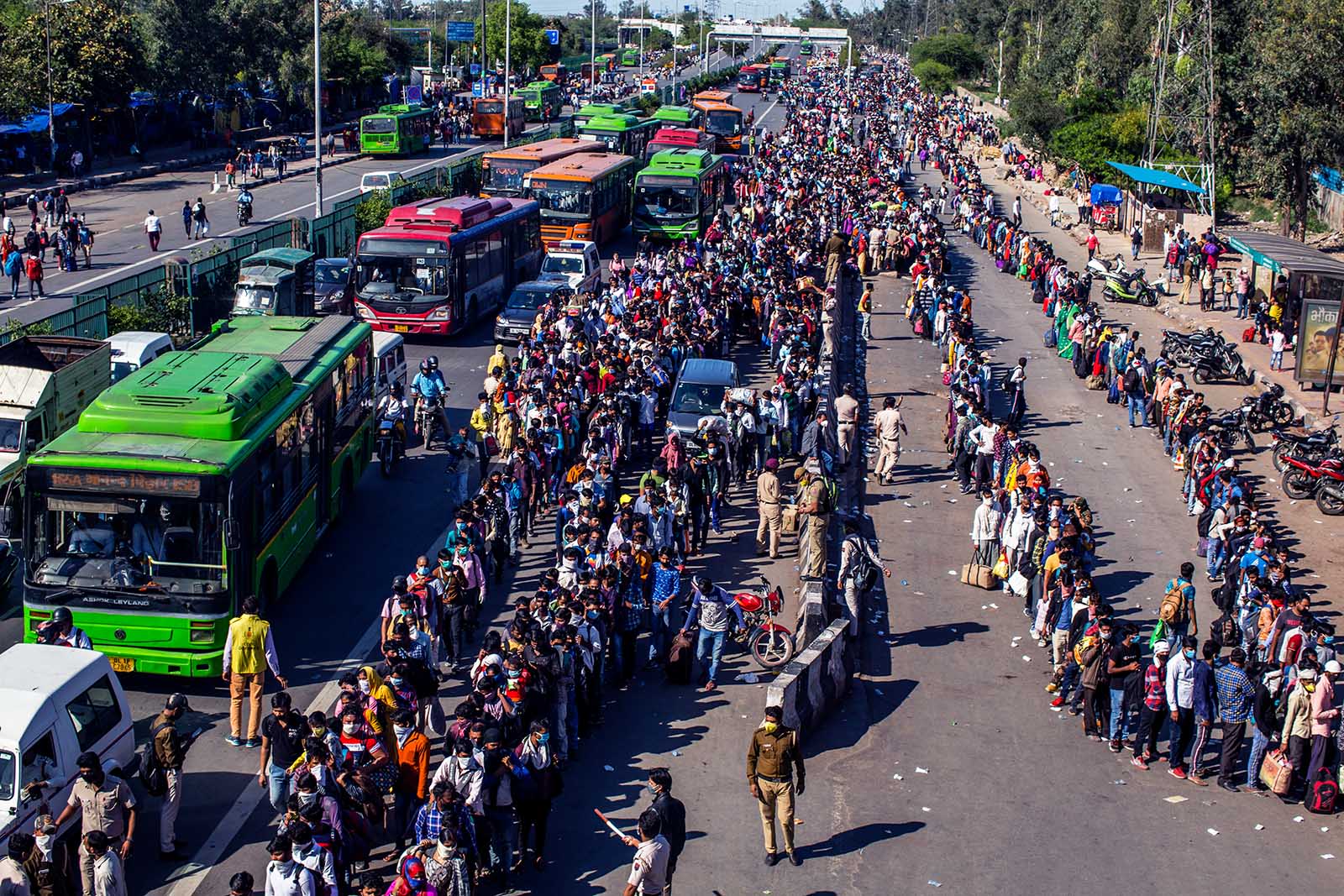
Crowds of migrant workers wait to board buses to return to their native villages as a nationwide lockdown continues in an attempt to stop the spread of COVID-19 in Ghaziabad, India on March 28, 2020.
Photo: Yawar Nazir/Getty Images
The COVID-19 pandemic has turned the lives of millions of workers around the world upside down, but it’s been particularly disruptive for migrant workers. Thousands have had to return to their countries of origin, often receiving hostile receptions for creating additional strains on the economy and causing fears about COVID-19 infection.
The International Labour Organization tracks migrant workers closely around the world. BRINK spoke to Michelle Leighton, who directs the ILO’s work on labor migration and mobility, and started the conversation by asking how COVID-19 had impacted global migration patterns.
LEIGHTON: Prior to the pandemic, there were 164 million migrant workers in the world, almost half of them women. And even before this, they were experiencing high levels of discrimination. They’re often in jobs that are highly temporary, and in informal sectors, sometimes in domestic work that is not covered by national or international labor standards in the country. Migrant workers habitually face discrimination and unequal treatment, often receiving low pay, sometimes below minimum wages set for nationals, and in many instances they lack access to social protection. These were issues, I think it’s fair to say, that have plagued the migration governance system for a number of decades.
Huge Numbers of Returning Migrant Workers
LEIGHTON: When the crisis hit and the pandemic resulted in lockdowns, it exposed the flaws in these governance structures and exacerbated the impacts to migrant workers. Many migrant workers are living in work sites that are overcrowded to begin with, and not able to provide any kind of social distancing or protection from exposure.
There’ve been a high level of forced repatriations from many countries, as well as those who returned voluntarily before the borders locked down. Nepal, which has 2.5 million workers in India, saw 500,000 workers return from India, while the Indian government is engaging in one of the largest repatriation efforts ever, bringing back over 100,000 Indian workers from different regions through flights, while many more have returned on their own. In Ethiopia, many have returned, with thousands more waiting in detention centers, and there are expectations that 200,000 or more could be forcibly returned by the year’s end.
BRINK: What challenges does this create for the countries that are having to reabsorb their own nationalities?
LEIGHTON: Well, it creates quite significant impacts to states that already had quite fragile labor markets, and are now experiencing higher levels of unemployment. These countries will face real challenges in creating employment opportunities for all nationals.
A number of countries, such as Nepal and Bangladesh, fear that by the end of the fall, they’re going to see hundreds of thousands more returnees who have lost their jobs in the Gulf or in other Asian countries as borders ease.
The Pandemic’s Effect on Migration Patterns
BRINK: Do you think that the pandemic and the recession will fundamentally change migration patterns?
LEIGHTON: In recent years, migration corridors have experienced large and rapid increases in the volume of migrant workers, particularly going from Asia to the Gulf states. We have also seen high numbers moving from African countries to the Gulf to work.
At the end of May, ILO reported that about 305 million full-time job equivalents would be lost by the second quarter of the year. Will those jobs come back for those migrant workers who’ve returned home? Will they really be able to go out again? It’s uncertain because the question is whether the businesses and the demand will come back and how rapidly it will come back.
I don’t doubt that migration is going to continue in high levels in the future because it has been increasing, but it may not happen as rapidly as many may believe. And we are likely to see a continuing diminution in remittances sent home.
Building Back Better
BRINK: Do you see any silver lining to this turmoil that might help migrants at all? Is there any sort of upside that might come out of any of this?
LEIGHTON: Well, we hope, of course, that there will be an upside, and that when recovery begins — and it already is starting in some countries — that countries use the opportunity to build back better. That certainly is the model the UN hopes to promote.
This is a real moment to look at the kinds of systems that can help countries rebuild in the origin countries, and ILO is helping countries to examine how to create positive environments for decent work.
Now is the moment to look at the failed institutions and the flaws in the governance frameworks and try to really readjust in earnest those kinds of systems. An example is the kafala system, where migrant workers are tied to their employers, prevented from changing jobs and requiring their employers to attest for exit visas, in addition to other restrictions on migrant workers’ rights. Allowing migrant workers to change employers, for example, would give them the flexibility to find work in other sectors and other areas. And that may help businesses in those countries to recover, but also help migrant workers to be documented, and not deported or sent home.
There is an opportunity for much more systematic cooperation between countries on orderly and safe returns, and to provide support for reintegration. So this is a real moment to look at the kinds of systems that can help countries rebuild in the origin countries, and ILO is helping countries to examine how to create positive environments for decent work.
The Systems Aren’t in Place
LEIGHTON: Those returning, for example, bring skills, talent and entrepreneurship know-how, but often their home countries do not have the systems and institutions in place to recognize the skills and talents, which also requires active engagement of the private sector .
There is a need to really improve labor market information systems for all workers and for businesses to help with skills and jobs matching. For ILO, this is a bread-and-butter issue: well-functioning and inclusive labor markets, and looking at how to develop and build the skills of the national workforce, particularly looking to the future of work.
BRINK: Is this a space where technology might be of use to help countries get a better understanding of what skills are needed and what gaps there are?
LEIGHTON: Yes, technology can help institutions managing labor market information, collecting data on migrant workers, and so on. Agriculture is one of those areas where nationals often don’t want to take those jobs, so having an e-recruitment system that is actually safe and fair, and based on ILO standards and guidelines, can be important tools.
The ILO and the World Bank have been monitoring exploitation in the recruitment process. Fair recruitment processes can help to omit labor brokers who are out there taking advantage of migrant workers, forcing them to pay sometimes tens of thousands of dollars or up to a year’s salary for their jobs.
If competition becomes more acute after the crisis, there will be a high risk of human trafficking and forced labor. This is a multibillion-dollar business, and it may become a multitrillion-dollar business if we can’t stop it. Building systems for disseminating better labor market information and putting technology into place for systems like e-recruitment or e-visas may help. If we do this, working with business, we might actually begin to attack this problem on a larger scale.
Being Part of the Discussion of the Solution
BRINK: What things can companies do to help mitigate these issues? Is there some guidance you can provide for companies?
LEIGHTON: Many businesses depend on migrant workers, and so, being engaged in the policy dialogue is one important area where business can help. Of course, businesses can commit to pay fair wages to migrant workers. The pandemic has increased the practice and danger of nonpayment or underpayment of wages to migrant workers, and some are using the crisis as a way to renegotiate worker contracts.
Really ensuring good business practices, including fair recruitment, are put in place, extending social protection to migrant workers and working with the government to ensure that there’s much more systematic, measured and protective labor migration frameworks in place will all help to ensure migrant workers’ rights.
Business has always cared about migration, but it hasn’t always become active in the political process. And I think it’s going to need to become part of the discussion to be part of the solution.




